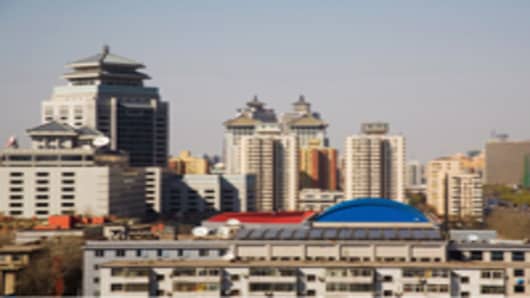Recent signs that China's economic slowdown is worsening has fueled fears a so-called hard landing. But even if that happens, many investors believe the world's second-largest economy has a big-enough safety net to contain the damage.
Decelerating growth in China would have substantial effects around the global economy, which is reeling from the European debt crisisand the lingering fears that the U.S. is speeding toward the edge of a fiscal cliff.
Most economists believe that the so-called hard landing, often described as growth that would slip under 7 percent or so, is avoidable.
But in a world where several crises in recent years have ended up much worse than they looked on the surface, Chinese policy makers won't be taking any chances, experts on the country's economy say.
"If a hard landing comes, obviously it's a major global issue because Europe's going nowhere and the United States is stagnating," said Michael Yoshikami, CEO and founder of Destination Wealth Management in San Francisco. "You're looking at a serious global event, obviously. It's not just China who's going be suffering."
Yoshikami just returned from a trip to Shanghai, where he said business is brisk.
He's not a subscriber to the hard-landing school of thought partly because he sees China sitting on huge cash surpluses and a still-improving business climate, and partly because Chinese central bankers stand at the ready with powerful stimulus options.
In fact, Yoshikami thinks now is a good time for investors to start "dipping in" to Chinese stocks, and recommends diversifying between both the Hang Seng and Shanghai indexes.
"The Chinese have such a surplus that they're going to carpet bomb as much as they possibly can to avoid a hard landing," Yoshikami said. "It's very easy to talk about a hard landing when you really aren't in China looking at what's happening."
Hedge fund titan Jim Chanos, at Kynikos Associates, is perhaps the most vocal naysayer on China in the investment community. Chanos cites vacant buildings throughout the nation as evidence that China overbuilt for a stampede that never came.
Bank of America Merrill Lynch recently cut its outlook for Chinese gross domestic product (explain this) growth to 7.7 percent from 8.0 percent in 2012, and from 8.0 percent to 7.6 percent in 2013. BofA based its negative revision on "China's slowing potential growth, falling new home starts and slower growth in developed economies."
"Despite the cuts, we are still believer of China’s soft-landing, and we think a growth pace above 7 percent is quite good given the colossal size of the Chinese economy and worsening external demand," BofA said in a research note.
"In this globalized era, no economies could be decoupled from others. Policy-wise, though we believe Beijing to step up policy easing/stimulus and Beijing still has deep pockets to engineer a faster growth," the firm said.
This month's BofA fund mangers' survey found a net 14 percent expecting growth in China's economy. (Read More: Cheap and Cheerful, Chinese Phones Outsmart Apple)
Not everyone is as enthused about China's prospects.
Weaker-than-expected inflationdata from July and a meager 1 percent export growth for the month have tamped down hopes that China would be able to make it through the global slowdown unscathed.
"If you look at some of the anecdotal data such as electricity production, Korean exports, coal prices, iron ore etc., I think you're looking more at mid-single-digit (GDP growth) at most," Jurrien Timmer, director of investment research for Fidelity Investments and co-portfolio manager of the Fidelity Dynamic Strategies Fund, told CNBC.
"If you define a hard landing as 6 percent or less growth...I think China is in a hard landing and you can start seeing that in the S&P earnings numbers," Timmer said.
In that instance, investors likely could expect a sharp round of stimulus, though policy makers probably would stop short of Federal Reserve-style money printing.
"What they're going to do is force banks to lend," Yoshikami said. "People forget that unlike Europe and the United States, (China) has cash in the bank. They don't need to sell Treasurys to make money. You print money when you don't have money."



